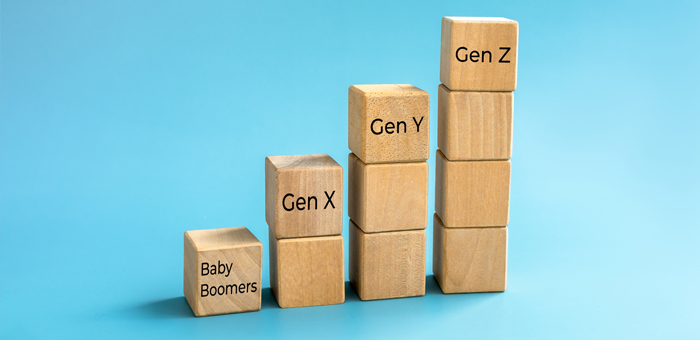
The generations: a bridge between values, behavior and communication
- On 31/05/2024
- AI, communication, generations
In the dynamic world we live in, understanding generational differences is essential to building effective communication (online or offline). Each generation is marked by key events, technological advances, and cultural influences that shape its characteristics, values, and behaviors.
The Lost Generation (1896-1928): Shaped by World War I, the Spanish Flu pandemic, and the Great Depression, this generation was characterized by stoicism, practicality, loyalty, independence, and frugality. Jazz music, the Golden Age of Hollywood, the press, radio were key cultural influences for people born then.
Great Depression Generation, World War II, Silent Generation (1928-1945): Surviving the hardships of their time, people born in these years have built themselves as conformists, hardworking, thrifty, resilient and resourceful. Rock and roll music, television, the press, radio, cinema, automobiles have influenced their development.
Baby Boomers (1946-1964): Born after the end of World War II, Baby Boomers are optimistic, individualistic, materialistic, progressive, and activists. Rock music, television, radio, cinema, the press are factors that have influenced them.
Generation X (1965-1980): Economic decline, rapid technological progress and globalization have had an impact on people born in these years and they are characterized as independent, pragmatic, adaptable, enterprising, but also cynical. Alternative rock music, video games, television, radio, press, cinema were favored by Generation X.
Generation Y (1981-1996): Globally oriented, entrepreneurial, socially engaged, independent, they reject traditions and value technology. Television, radio, press, cinema, internet, video games, blogs, vlogs are key cultural influences that affect this generation.
Generation Z (1997-2012): Digital, globally oriented, entrepreneurial, socially engaged and independent, it is marked by the Internet, social media influencers, streaming services.
Generation Alpha (2010-2024): It is still early to define its characteristics, but it is expected to be entrepreneurial, empathetic, adaptable and highly technologically literate. Artificial intelligence, virtual and augmented reality, globalization, climate change and uncertainty are factors that are likely to impact them.
The language we use in our communication can have a different meaning for each generation. To influence him effectively, we need to speak his language and use appropriate terminology and tone. By understanding these aspects, we can create more effective and meaningful connections with people of different generations, which is essential to the success of our communication efforts.



